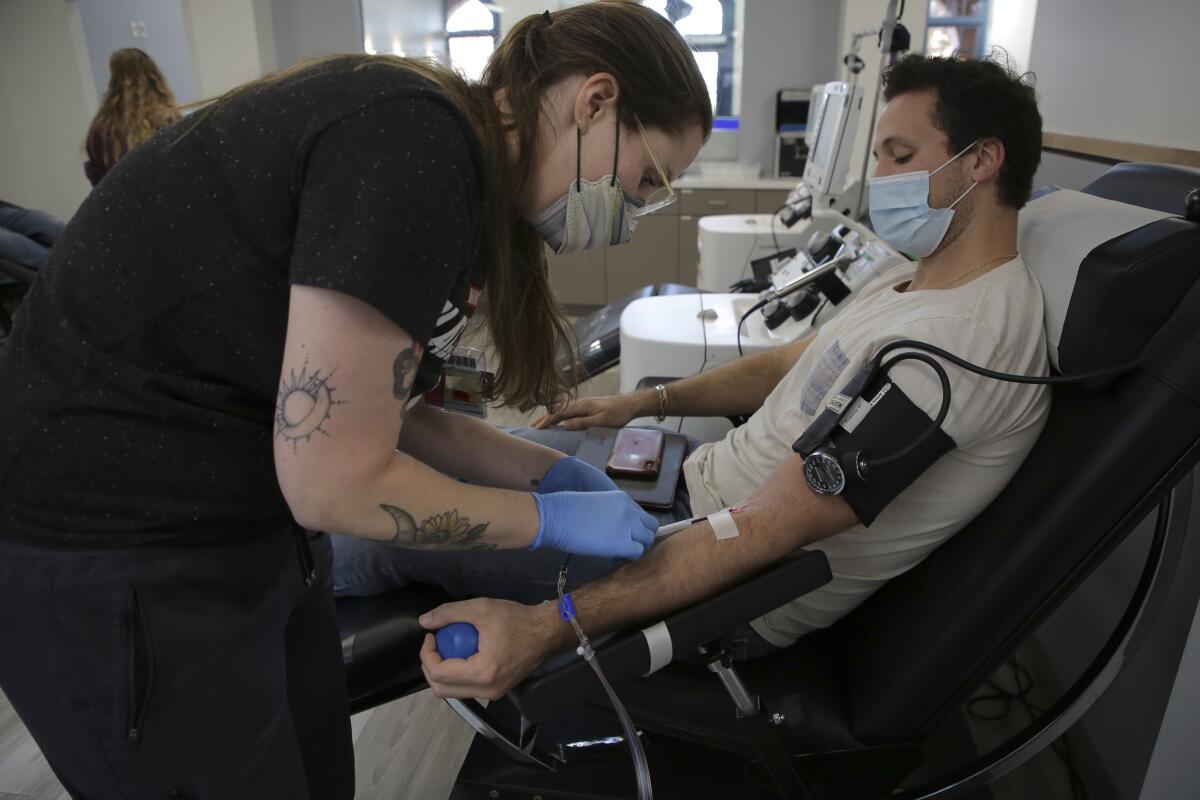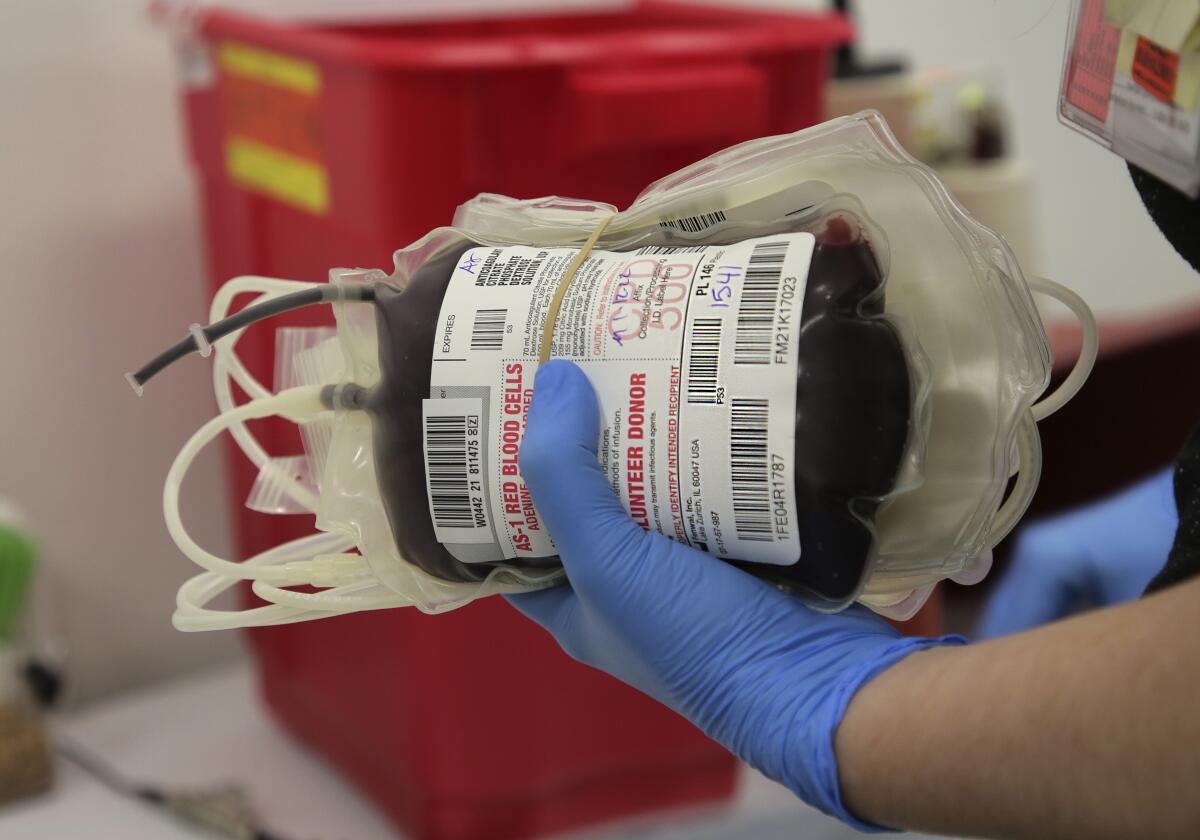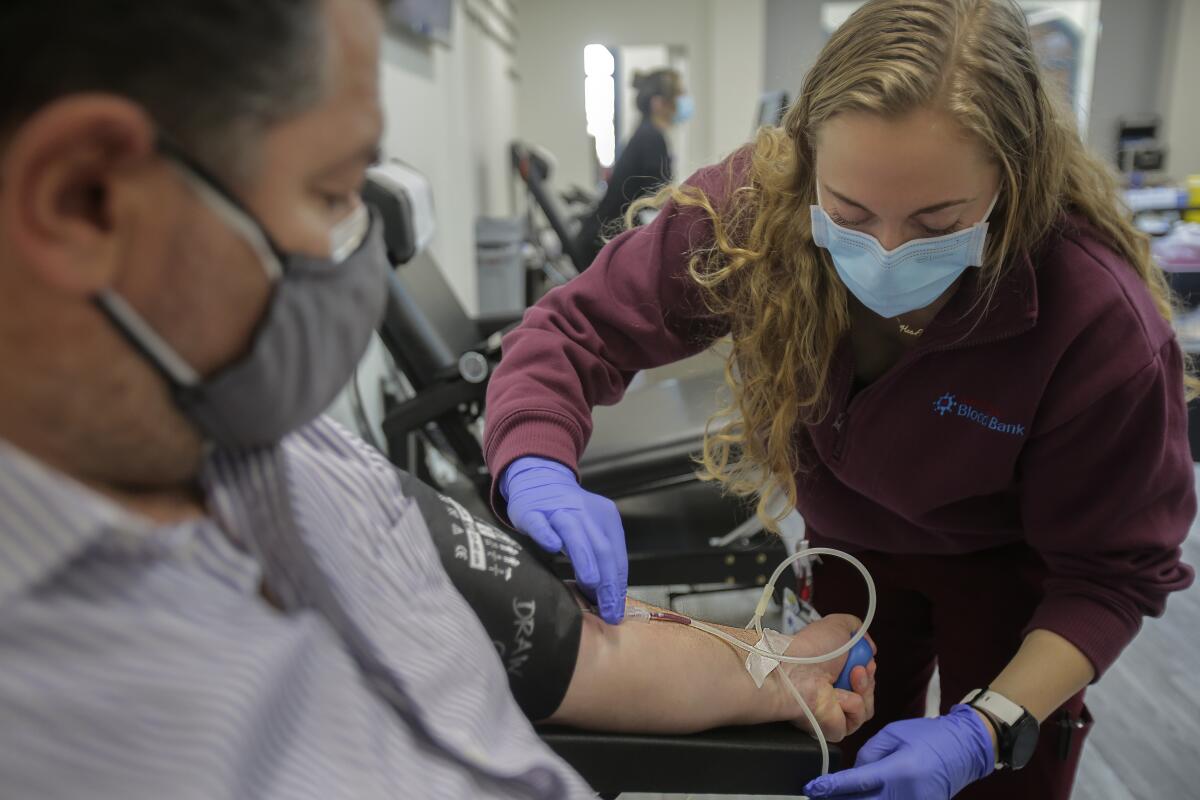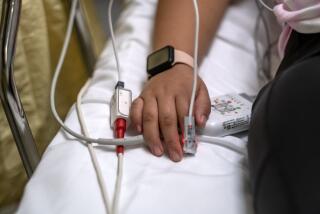Blood shortage reaches crisis levels at San Diego County hospitals

- Share via
SAN DIEGO — Blood supplies at San Diego County’s busiest trauma centers are so critically low that many worry it won’t be long before someone dies because there were not enough units left on the shelf.
“If we have one mass-casualty incident in San Diego with the blood supply as low as it is right now, lives will be lost, and that will be heartbreaking,” said Dr. Ghazala Sharieff, chief medical officer at Scripps Health.
Dr. Patricia Kopko, medical director of transfusion services at UC San Diego Health, agreed, noting that while “mass-casualty” conjures visions of a bombing or a plane crash, it wouldn’t take anything nearly so big to exhaust blood supplies.

“It could be as simple as a four-car pileup,” Kopko said.
On Tuesday, Scripps faced a situation where supply ran out.
Sharieff said the health system was handling two simultaneous trauma cases, both of which required significant transfusions. With nothing left, hospital personnel were forced to scramble, reaching out to neighboring hospitals and securing enough units at the last minute.
“We were able to patch it, but that may not be the case next time,” she said.
It’s the wrong moment for a blood shortage. Hospitals continued to struggle with emergency care this week with the local EMS system declaring, effective at 8 a.m. Thursday, that emergency rooms could no longer put themselves on “diversion” for the next 14 days. That’s because medical centers are facing severe increases of patients and a reduction in the number of staff. Without the ability to limit incoming ambulance traffic, hospitals find themselves one step closer to having to make hard choices about who they can serve and who they can’t.
Meanwhile, the county’s weekly COVID-19 update on Wednesday reported 14,734 additional cases. Hospitalizations reached 1,103 Tuesday and are projected to hit record highs next week.
San Diego County’s blood situation is part of a national shortage driven by an unprecedented increase in the demand for medical care that many attribute to delayed treatment in 2020 and 2021 and to a simultaneous surge in coronavirus infections.
The Omicron variant’s rapid spread has sidelined workers in every industry, from aviation and public safety to healthcare and education.

A spokesperson for Sharp Healthcare said the system is monitoring the situation, including the need for O positive blood, the most common type, and is holding blood drives.
In Los Angeles this week, the county health department shut down the trauma center at Harbor-UCLA Medical Center to new patients for hours because of blood shortages. It was a step, officials said Wednesday, that they have not had to take in more than 30 years.
Blood banks are taking hits from two directions. Doug Morton, interim chief executive at the San Diego Blood Bank, said employees are calling in sick at the same time that donors are backing out of appointments after testing positive for COVID-19.
An increase of illness in the community directly affects the blood banks’ ability to collect because they cannot accept donations from sick donors.
The surge is also snarling operations that have traditionally brought in a significant share of the community’s blood supply.
Blood banks use mobile units that travel to locations throughout the community, such as large employers, to conduct blood drives, but that source has been difficult to tap over the past two years as the pandemic has forced many businesses to operate remotely. More recently, Morton said, local high schools have canceled scheduled drives as they deal with Omicron’s effects on their staffs and students returning to campus after the holiday break.
The current situation, Morton said, keeps him up at night.
“We consider three days of supply critical, and we’re down to one for O positive blood,” Morton said.
The American Red Cross of San Diego and Imperial Counties supplies both UC San Diego and Scripps, operators of the region’s only two Level 1 adult trauma centers.
Dr. Catherine Mazzei, a medical director for Red Cross California, said shortages have caused a change in blood banking operations, with supplies pushed out to hospitals and little if any held in reserve at regional distribution locations.
That policy led to the recent situation at Scripps in which the Red Cross was unable to send additional units to help bridge the double trauma emergency that Sharieff described.
“The hospitals say, ‘Oh, we can’t order blood STAT,’ but that’s because we’re sending everything to them,” Mazzei said. “It doesn’t do us any good on our shelves; we’d rather have the blood at all the major hospitals in the hope that they can stay open and trade back and forth as opposed to having it stay in one of our depots.”
All blood banking services are currently pleading with the public to come forward and donate in this critical moment.
With such a large percentage of the community sick and unable to donate, Kopko said, those who are currently well truly have a superpower.
“If you are feeling well and healthy right now, celebrate by going out and donating blood,” Kopko said.
Sharieff put an even finer point on it. It’s time, she said, for the community to step up and save itself.
“We can’t be calling around at 2 a.m. looking for blood when someone’s bleeding out in front of us,” she said.
Appointments are available at RedCrossBlood.org and sandiegobloodbank.org, or by calling the Red Cross at (800) 733-2767 or the San Diego Blood Bank at (619) 400-8251.
More to Read
Sign up for Essential California
The most important California stories and recommendations in your inbox every morning.
You may occasionally receive promotional content from the Los Angeles Times.














